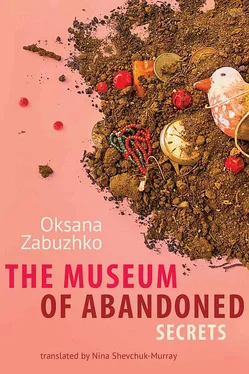How could you show this on film? Even if you could, if you found it somewhere, on a friend’s cell-phone video or a clip from a birthday, a party, someone’s wedding—she was a fashionable artist; she was everywhere all the time, and there had been so much of her that in the first months after her death, Kyiv seemed deserted—even if you had it on film, what would it mean to anyone?
I have come to think that a person’s life is not so much, or rather is not just , the dramatically arched story with a handful of characters (parents, children, lovers, friends, and colleagues—anyone else?) that we pass on more or less in one piece to our descendants. It’s only from the outside that life looks like a narrative, or when viewed backwards through a pair of mental binoculars we put on when we have to fit ourselves into the small oculars of résumés, late-night kitchen confessions, and home-spun myths, trimming and shaping life into orderly eyefuls. When seen from the inside, life is an enormous, bottomless suitcase, stuffed with precisely such indeterminate bits and pieces, utterly useless for anyone other than its owner. A suitcase carried, irredeemably and forever, to the grave. Maybe a handful of odds and ends fall out along the way (a request for pear compote, a sinuous balletic pas like that of a cat about to pounce) and remain to rot in the minds of witnesses and mourners, so whenever I stumbled into one of those lost, disowned scraps I was filled with a vague but insistent shame of my inadequacy, as if this piece, this accidental survivor, contained the key—the lost secret code to the deep, subterranean core of the other person’s life—and now I have it, but I don’t know which door it unlocks or if such a door even exists.
* * *
I didn’t get this from TV, from the stories and people in front of the camera.
There was the day when, for some reason leafing through an old pulpy book from my father’s library, I ran into a note in the margin of a yellowed coarse page (Soviet newspaper stock) in Dad’s characteristically dense, thorny script (sometime in the seventh or eighth grade my own handwriting aspired to imitate his, but eventually mellowed out, untangled, and came to resemble Mom’s) written next to the apparently innocuous, idiotic critique, “Hamlet’s hesitation to act decisively in sight of triumphing evilness.” (God, the language! Still struggling to find its way out from under the debris of Stalin’s pogroms, limping and dragging on broken-splintered bones.)
He underlined this critique with an impulsive, nearly straight line, and scrawled an equally triumphing this!!! with three exclamation marks in the margin. It struck me like a divinely inspired epiphany. In that instant I realized I didn’t know my father. He died when I was barely seventeen. I only remembered him the way he was in relationship to me as a teenager, a child, and from those memories, amended with a few cryptic posthumous (and petrified for lack of new material) remarks from Mom, his friends, colleagues, and his students—who seemed to have adored him unless they are all lying—I constructed a mental image: an avatar with the appearance of my father as I remembered him at forty-five, hospitalized and almost at the end of his bleak story, the kind not uncommon for his generation. And yet this man… no, wait… a much younger man (I did the math quickly: he would’ve been younger than I am now!) who read this book sometime in the late fifties or early sixties, before I was here (a mythical formula that inevitably prompts a child to ask, “And where was I?”), and scribbled his enthusiastic this!!! in the margins—exactly as I would have done had I found an idea I recognized as similar to my own, sympathetic to something I’d been thinking, turning over, worrying, living—was beyond the contours of the simulacrum I carried in my mind, as if the two—this one and the one in my head—didn’t know each other; or rather, I didn’t know this other, new one.
This man and I shared, I could tell, a vague but fundamental kinship; I could see so clearly (from inside, as we see ourselves in dreams) how in that instant the pieces of the puzzle triumphantly clicked into place in his mind— this!!! —a snap like the sound he might’ve made with his fingers, the thumb and the middle one, just as I do sometimes, in moments of intense excitement. And suddenly I recalled that he did have the habit of snapping his fingers and that it irked Mom, who told him it was vulgar and a bad example for the child, which made him sheepish—and this was new, too, because I’d never remembered him to be anything but very confident. I don’t think I’d ever heard him say, “I don’t know” or “I was wrong.”
But something had been shaken loose in my memory, and another wave of recollection washed over me: one night I found the bunny I’d drawn in my school sketchbook covered in inexplicable blue spots, and I went bonkers—and Dad, mortified like a little boy caught red-handed, confessed that it was his fault; he wanted to make the bunny gray but just missed a bit with the color. At the time I seethed with righteous indignation; I could not grasp why he would’ve sneaked into my sketchbook and touched my paints—he who’d never put a drop of paint on a shred of paper in his entire life, who didn’t even know how to hold a brush!—and, for a long time, I’d bring up the ruined bunny whenever I needed to one-up him, because it never failed to shame him again. Only now, with this new internal vision, did I see this little prank as it must have felt to him, and realized that it wasn’t the act of spoiling my picture (for which I, the incurable perfectionist, still got an A!) that he was ashamed of, but his inability to resist his childish impulse—the sudden spark of curiosity, the urge to watch the paint billow in the jar of water, watch it fill the brush and color the white spots on the paper—and that he, a grown man and a paterfamilias , was caught in this momentary, unbefitting weakness.
All of this was unspooling, faster and faster, one thing pulling on another, as if the inky scribble in the margin, like a loose thread I grasped, had led to a vast sunken rhizome—a lace of feathery roots that retained the shape of an entirely different, unfamiliar life, one independent of a daughter, a wife, or any friends—but I had no means of seeing it clearly, up close. He had taken his suitcase with him.
I remember I climbed with my feet into the armchair and scoured the whole book, inventing a new reading method on the spot: not from left to right, or from right to left, but in concentric circles, chewing on the text, like the hungry caterpillar, beginning with the underlined phrase, “Hamlet’s hesitation to act decisively in sight of triumphing evilness.” I had no other key—no other trinket had slipped into my hands from the suitcase that had already been taken away from me—nothing that wouldn’t have turned into dust in the twenty years since Father died. So I pondered this!!! , so casual in the margin, like detective Columbo scrutinizing a set of uncommon tooth marks on a cigarette holder that he’d found next to the body; the only difference was I wasn’t looking for the murderer—I wanted to raise the dead.
What the book was about I couldn’t tell you under threat of torture, but by the end of my necromantic investigation I became firmly convinced that my father’s long “struggle against the system” (as we Ukrainians have been calling it since 1991)—his desperate knocking on all those imposing oak doors; his countless letters, complaints, reports, and petitions to the Kyiv City Council, the Solicitor General’s Office, the Ukrainian Central Communist Party Committee, and the Central Committee in Moscow (three or four bulging folders, held by strings tied into dead, eternal knots and stored in Mom’s attic); his trips to Moscow, each of which was supposed to resolve things once and for all, only every time they sent his query back to Kyiv and he had to start the cycle all over again—the whole gory mess that replaced his life and that finally sent him to the loony bin with the then-typical political diagnosis of “acute paranoid psychopathy,” stemmed from nothing other than my father’s secret knowledge that he, too, shared, like a shameful disease, Hamlet’s damned hesitation to act decisively in sight of triumphing evilness. And when the evil imperial machine rolled by, almost but not quite brushing him, it was this knowledge that prevented him from stepping back, that compelled him to throw himself in its path, and made him do so, again and again, each time recapturing the right to self-respect.
Читать дальше












